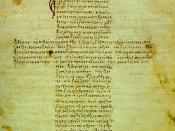Physician Assisted Suicide
The classical version of the Hippocratic oath states that a doctor should never give a deadly drug to anyone who asks for it, nor should he make a suggestion to this effect. The oath also states that the doctor should not give a woman an abortive remedy. In support of this oath, it is morally objectionable to ask a physician to participate in a physician assisted suicide. Based on the modern version, however, it is evident that time has changed many aspects of this oath. Today physicians may perform abortions. Although the oath does not clearly state that a physician has the right to assist in ending a life, it does state that there is more to medicine than preserving life with surgery and medicine. Warmth, compassion and sympathy are to be taken into consideration, which may be implied that there are more changes to come.
The moral solution to the debate of physician assisted suicide and euthanasia, passive or active, is ongoing.
The traditional view of J. Gay-Williams and Phillippa Foot, who make the clear distinction between active and passive euthanasia, is morally irrelevant. What is the difference between letting someone die by withholding medication or giving pain medication to pacify until natural death occurs and giving a terminally ill patient the opportunity to inject a lethal dose of medication to themselves. The physician is still doing by not doing. The physician is letting someone die, passively or actively. Either way, in contradiction of the Hippocratic oath, it is not preserving life.
James Rachels's, Active and Passive Euthanasia, makes the moral irrelevance clear. Physicians are trained to cure, treat and prevent further suffering. If this is to be so, one can assume that all three actions will be applied. If the patient cannot be...


